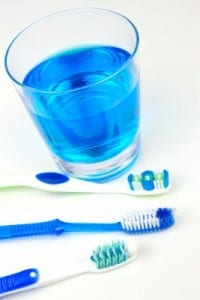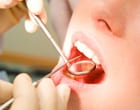 Super markets and pharmacies sell a wide variety of mouthwashes which advertise benefits to oral health. It is the claim if mouthwashes that they are good for stopping gum disease and freshening breath. If you are wondering about whether mouthwashes are effective when it comes to your oral health, you could do worse than ask your dentist in the Leeds area all about it.
Super markets and pharmacies sell a wide variety of mouthwashes which advertise benefits to oral health. It is the claim if mouthwashes that they are good for stopping gum disease and freshening breath. If you are wondering about whether mouthwashes are effective when it comes to your oral health, you could do worse than ask your dentist in the Leeds area all about it.
Mouthwashes are available in a wide variety of shapes, sizes and colours and are used by swilling a small amount in your mouth and then gargling with them. Mouthwash manufacturers recommend that the mouth is rinsed thoroughly with water after the mouth wash has been used.
While it is true that mouthwash freshens up the breath by perfuming it with whatever fragrance it uses, the unfortunate fact is that, in the long term, they can leave you with worse bad breath. Many mouthwashes boast that they can kill much of the bacteria in the mouth but in doing so they also leave the mouth rather dry. When your mouth is dry it provides ideal conditions for bad breath bacteria to return and thrive because the bacteria find it more easy to cling to teeth if there is less saliva around.
When there is less saliva in the mouth, your teeth and gums are less protected from plaque because saliva is actually part of your natural defence against the plaque bacteria. As such, using mouthwash often can leave you more prone to dental decay and gum disease although in some cases the occasional use of mouthwash is recommended by dentists in order to combat gingivitis.





 Bad breath can be very embarrassing and can also be the source of great anxiety, especially because it is very hard to tell yourself if you are suffering. This can cause many people to rely on oral hygiene products such as mouthwash and breath freshening spray to keep their breath smelling fresh. What they might not realise is that not only do these products not really work but they could even be making the breath worse.
Bad breath can be very embarrassing and can also be the source of great anxiety, especially because it is very hard to tell yourself if you are suffering. This can cause many people to rely on oral hygiene products such as mouthwash and breath freshening spray to keep their breath smelling fresh. What they might not realise is that not only do these products not really work but they could even be making the breath worse. Bad breath can be a source of great embarrassment for many sufferers. One of the main problems of having bad breath is that it is often very difficult to tell when you are affected by it. Many people resort to using mouthwashes and other products that can apparently combat bad breath but without realising it might be making the situation worse.
Bad breath can be a source of great embarrassment for many sufferers. One of the main problems of having bad breath is that it is often very difficult to tell when you are affected by it. Many people resort to using mouthwashes and other products that can apparently combat bad breath but without realising it might be making the situation worse.

